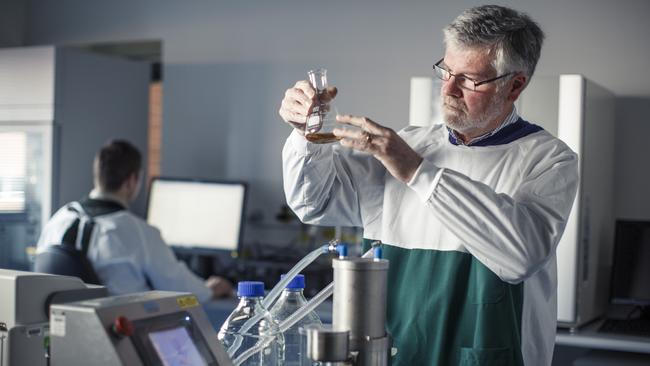Adelaide researchers invent a new life-saving vaccine against bacterial infections
AN ADELAIDE start-up has invented a world-first vaccine to tackle a bacteria that kills up to two million children globally a year.
SA News
Don't miss out on the headlines from SA News. Followed categories will be added to My News.
- SA proposes law to ban unvaccinated kids from childcare
- Immunisation rates rise across the country
- Best and worst suburbs for vaccinations
AN ADELAIDE start-up has invented a world-first vaccine to tackle a bacteria that kills up to two million children globally each year.
They die from pneumonia, middle-ear infections and bacterial meningitis — all of which are caused by streptococcus pneumoniae, which is also potentially deadly for the elderly.
The existing vaccine only protects against 13 of 97 strains of the bacteria.
GPN Vaccines, a start-up which sprang out of the University of Adelaide and uses the work of Gamma Vaccines, has created a broad-spectrum vaccine for the bacteria.
The State Government has given GPN a $300,000 grant to start making the vaccine to go through the trial process.
SA Scientist of the Year James Paton and biotech entrepreneur Tim Hirst are at the helm of the project, which Prof Hirst said was a “holy grail” of vaccines.

Prof Paton, director of the Research Centre for Infectious Disease at the University of Adelaide, has been working on vaccines for decades. Innovation Minister Kyam Maher said the breakthrough could bring jobs to the state.
“A new universal pneumococcal vaccine has the potential to be used in global markets and have substantial health benefits in the prevention of fatal and debilitating diseases,” he said.
Prof Hirst said while they were at an early stage “it all looks extremely promising”.
“The vaccine helps protect against different serotypes and that’s the holy grail,” he said.
“The key thing that we’re going to try to achieve this year is to develop a large-scale manufacturing process that is suitable for producing clinical trial material that can be tested in a human clinical trial.”

It could take seven years to have a vaccine available.
“It’s a battlefield out there between the bacteria on one hand and the immune system on the other,” Prof Hirst said.
“With a vaccine, you equip the immune system to defend itself against the pathogens out there.”
The bacteria, according to GPN, “kills more children than AIDS, malaria and tuberculosis combined”.
Scientists hit the bacterium with gamma-rays to inactivate it and make a vaccine.
When he won the SA Scientist of the Year gong two weeks ago, Prof James Paton named his work on the pneumococcal vaccine as a career highlight.
He told The Advertiser of his decades-long passion for the study. “Even in 1980, when I first moved into this area, infectious diseases counted for 30 per cent of all deaths on this planet,” he said.
“Massive wars have never achieved a net reduction (of people) but infectious diseases have.”


